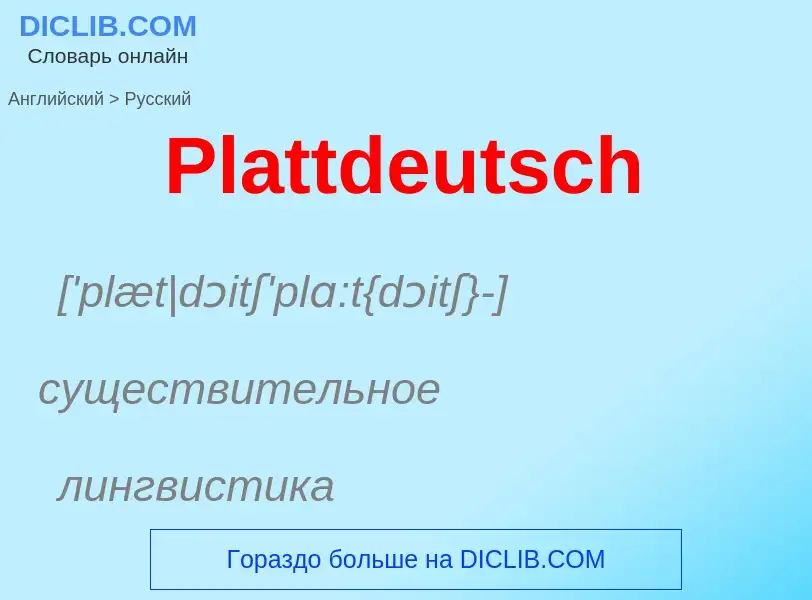Traducción y análisis de palabras por inteligencia artificial ChatGPT
En esta página puede obtener un análisis detallado de una palabra o frase, producido utilizando la mejor tecnología de inteligencia artificial hasta la fecha:
- cómo se usa la palabra
- frecuencia de uso
- se utiliza con más frecuencia en el habla oral o escrita
- opciones de traducción
- ejemplos de uso (varias frases con traducción)
- etimología
Plattdeutsch - traducción al ruso
['plæt|dɔitʃ'plɑ:t{dɔitʃ}-]
существительное
лингвистика
нижненемецкие диалекты
общая лексика
нижненемецкий язык
[ləu'dʒə:mən]
общая лексика
нижненемецкий язык
Definición
Wikipedia
Low German or Low Saxon (Low German: Plattdüütsch, Neddersassisch and other names) is a West Germanic language variety spoken mainly in Northern Germany and the northeastern part of the Netherlands. The dialect of Plautdietsch is also spoken in the Russian Mennonite diaspora worldwide.
Low German is most closely related to Frisian and English, with which it forms the North Sea Germanic group of the West Germanic languages. Like Dutch, it has historically been spoken north of the Benrath and Uerdingen isoglosses, while forms of the High German language (of which Standard German is a standardized example) have historically been spoken south of those lines. Like Frisian, English, Dutch and the North Germanic languages, Low German has not undergone the High German consonant shift, as opposed to Standard High German, which is based on High German dialects. Low German evolved from Old Saxon (Old Low German), which is most closely related to Old Frisian and Old English (Anglo-Saxon).
The Low German dialects spoken in the Netherlands are mostly referred to as Low Saxon, those spoken in northwestern Germany (Lower Saxony, Westphalia, Schleswig-Holstein, Hamburg, Bremen, and Saxony-Anhalt west of the Elbe) as either Low German or Low Saxon, and those spoken in northeastern Germany (Mecklenburg-Western Pomerania, Brandenburg, and Saxony-Anhalt east of the Elbe) mostly as Low German. This is because northwestern Germany and the northeastern Netherlands were the area of settlement of the Saxons (Old Saxony), while Low German spread to northeastern Germany through eastward migration of Low German speakers into areas with a Slavic-speaking population (Germania Slavica).
It has been estimated that Low German has approximately 1.6 million speakers in Germany, primarily Northern Germany, and 2.15 million in the Netherlands.

![Pomerania]] with its capital ''Stettin'' (now [[Szczecin]], Poland), where east of the Oder [[East Pomeranian]] dialects were spoken, and [[East Prussia]] with its capital ''[[Königsberg]]'' (now [[Kaliningrad]], Russia), where [[Low Prussian]] dialects were spoken. ''Danzig'' (now [[Gdańsk]], Poland) was also a Low German-speaking city before 1945. The dialect of ''Danzig'' ([[Danzig German]]) was also [[Low Prussian]]. Pomerania]] with its capital ''Stettin'' (now [[Szczecin]], Poland), where east of the Oder [[East Pomeranian]] dialects were spoken, and [[East Prussia]] with its capital ''[[Königsberg]]'' (now [[Kaliningrad]], Russia), where [[Low Prussian]] dialects were spoken. ''Danzig'' (now [[Gdańsk]], Poland) was also a Low German-speaking city before 1945. The dialect of ''Danzig'' ([[Danzig German]]) was also [[Low Prussian]].](https://commons.wikimedia.org/wiki/Special:FilePath/Ls-dialects.jpg?width=200)
![City limit sign in Lower Saxony:<br>[[Cuxhaven]]-Altenbruch<br>(Standard German)<br>Cuxhoben-Olenbrook<br>(Low German) City limit sign in Lower Saxony:<br>[[Cuxhaven]]-Altenbruch<br>(Standard German)<br>Cuxhoben-Olenbrook<br>(Low German)](https://commons.wikimedia.org/wiki/Special:FilePath/Oortsschild von Olenbrook, Landkreis Cuxhoben 4.jpg?width=200)
